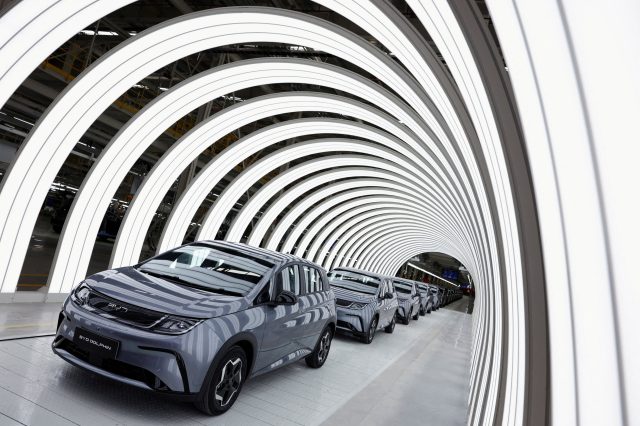Chinese electric vehicle (EV) giant BYD and the Industry and Technology Ministry signed Monday an investment agreement of nearly $1 billion to open a plant in the country, marking a historic deal for the Turkish automotive sector.
The agreement envisages the car manufacturer establishing an electric and rechargeable hybrid car production facility with an annual capacity of 150,000 vehicles and an R&D center for sustainable mobility technologies in Türkiye.
The signatures with the Chinese automotive giant were signed at the Presidential Dolmabahçe Working Office in Istanbul, under the auspices of President Recep Tayyip Erdoğan, by the Industry and Technology Minister Mehmet Fatih Kacır and BYD Chairperson and CEO Wang Chuanfu, the ministry said.
The facility is planned to provide direct employment for up to 5,000 people and is planned to start production at the end of 2026.
“Thanks to Türkiye’s unique advantages such as its developing technology ecosystem, strong supplier base, extraordinary location and qualified workforce, BYD’s investment in this new production facility will further improve the brand’s local production capabilities and improve logistics efficiency,” the Chinese automaker said in a statement.
“We aim to reach consumers in Europe by meeting the increasing demand for new energy vehicles in the region,” it added.
“We are in a historic day for our automotive industry. We took the first step of a huge investment to be made in our country,” Kacır said in a post on X, formerly Twitter, shortly after the announcement of the deal.
“In the presence of our President Erdoğan and Wang Chuanfu, Chairman of the Board of Directors of BYD, the world’s largest electric vehicle manufacturer, we signed an agreement for the company to invest in Türkiye,” he added.
“Within the framework of the agreement, we envisage that BYD will establish an electric and rechargeable hybrid car production facility with an annual capacity of 150,000 vehicles and an R&D center for mobility technologies in our country, with an investment of approximately $1 billion. The facility, which is planned to start production at the end of 2026, will directly employ up to 5,000 people,” said the minister.
This investment decision, taken as a result of the intensive negotiations we have had since our visit to China in December, shows that Türkiye is a center of attraction for global investments, he stressed.
In Türkiye, which is the third largest automobile manufacturer in Europe and the leader in exports with an annual amount of over $35 billion, our primary goal is the transformation towards new generation and environmentally friendly electric vehicles in the automotive sector, he further said.
The minister continued on to say that this investment decision of global technology leader BYD for the production of new generation vehicles with high domestic added value “is the result of the investor-friendly policies we maintain under the leadership of our president and the support we offer to investments.”
There were no details on the location of the facility to be built but earlier media reports indicated it would be in the western Manisa province.
Getaway to Europe
“Türkiye is a gateway for investors to access the European market through the Customs Union and many export markets thanks to free trade agreements. Those who trust and invest in Türkiye will continue to win,” noted Kacır.
The news on the investment, one of the largest in recent years comes days after the EU slapped additional provisional tariffs of up to 38% on Chinese EVs following an investigation that concluded state subsidies meant they were unfairly undermining European rivals.
Turkish-made cars enjoy beneficial access to the EU under a customs union that dates to 1995 and the Marmara region around Istanbul has become one of the leading centers of the world’s automobile industry.
Major carmakers including Fiat and Renault opened plants there at the beginning of the 1970s, with others like Ford, Toyota and Hyundai following, taking advantage of Türkiye’s position at the crossroads between Europe, Asia and the Middle East.
“BYD is the world’s largest manufacturer of electric vehicles and one of the most advanced in terms of technology and manufacturing quality,” independent consultant Levent Taylan told Agence France Presse (AFP) earlier during the day.
“Indeed, this will be an investment for the Turkish market but especially the European market, by circumventing the customs tariffs imposed on vehicles of Chinese origin,” he said.
He said BYD has the potential to sell around 20,000-25,000 vehicles per year on the Turkish market and export 75,000 to the EU.
“A plant (in Türkiye) with 100,000-125,000 vehicles per year in installed capacity would be a reasonable investment,” he added.
Under new Turkish regulations on investment incentives, BYD will be able to circumvent a new 40% tariff that Türkiye imposed on electric vehicle imports.
China has led the global shift to electric vehicles, with almost one in three cars on its roads set to be electric by 2030, according to the International Energy Agency’s (IEA) annual Global EV Outlook.
Chinese EV manufacturers have also stepped up exports, prompting many nations to take measures to protect their automakers.
They have also begun looking at manufacturing abroad, with BYD having already announced plans to open its first European factory in Hungary. Earlier this month, the company also opened a factory in Thailand.




